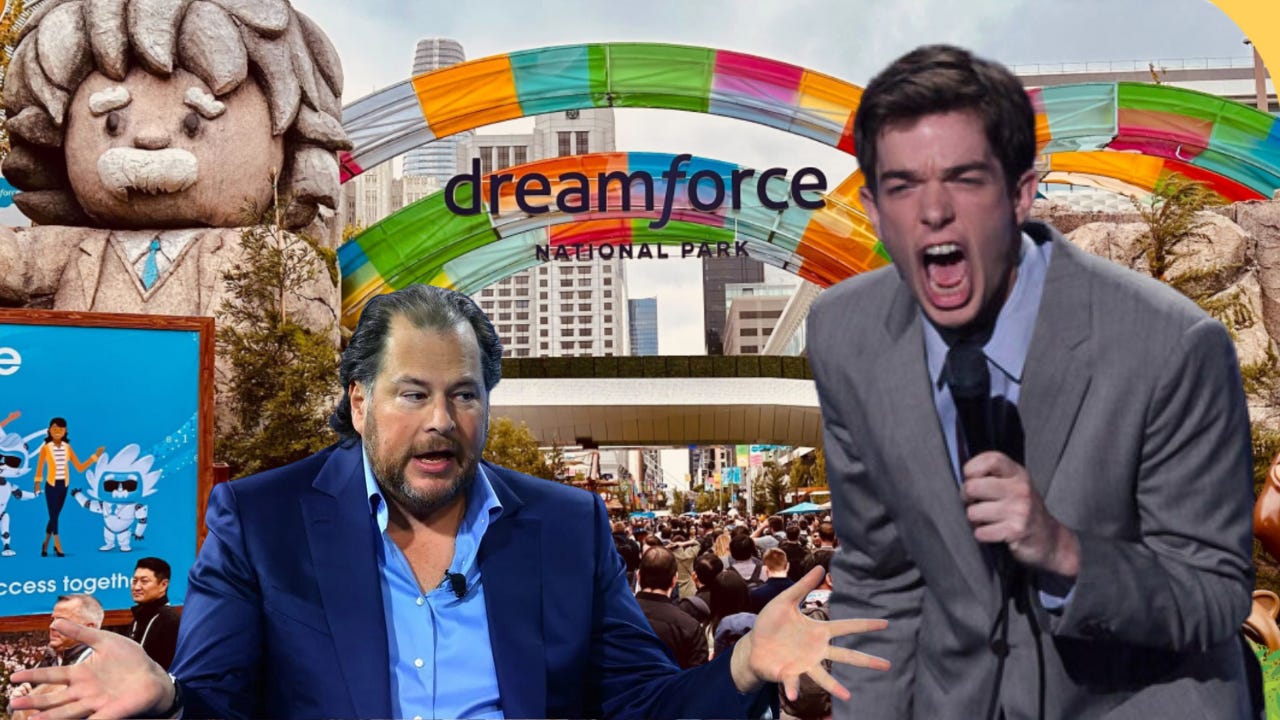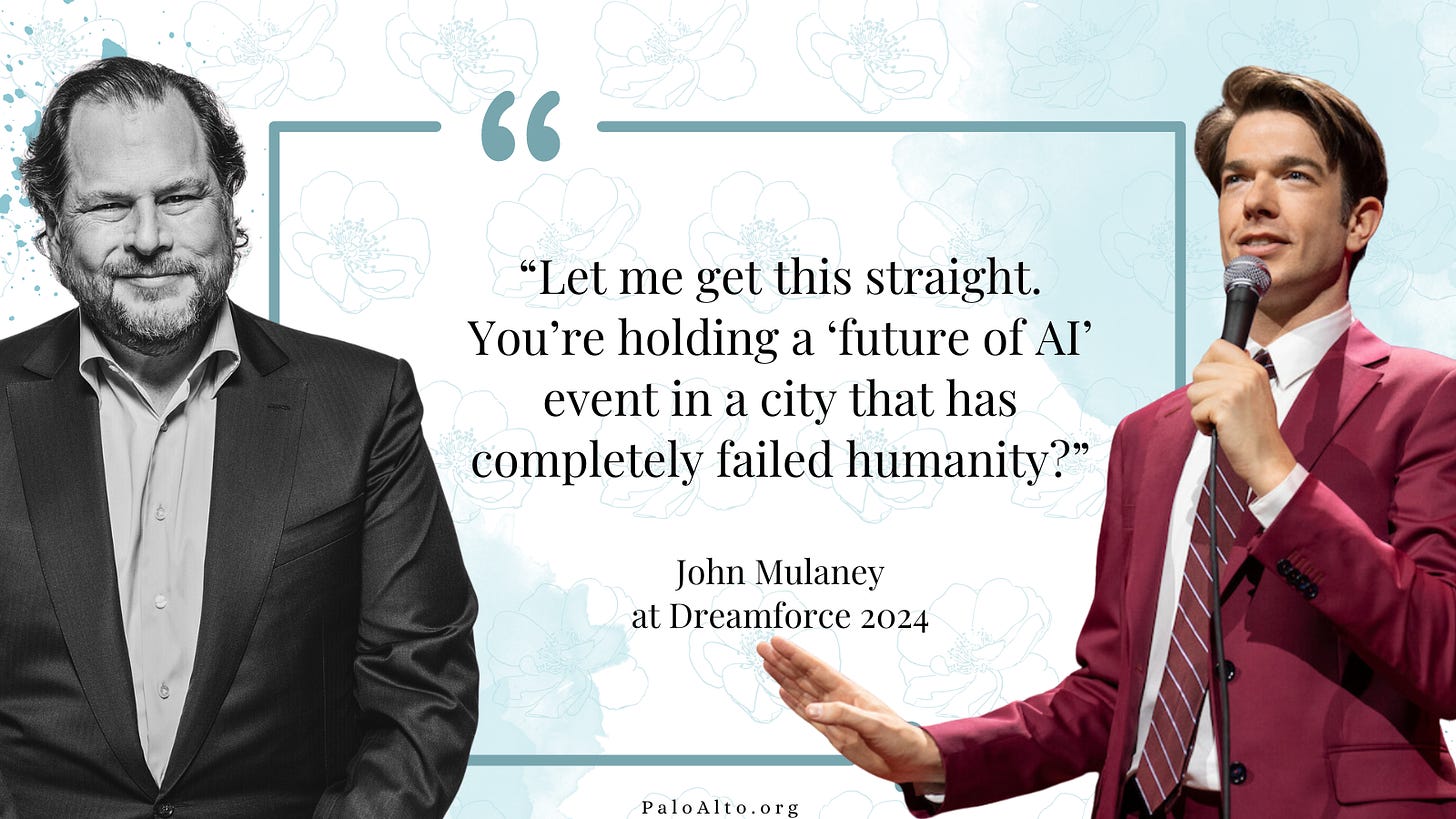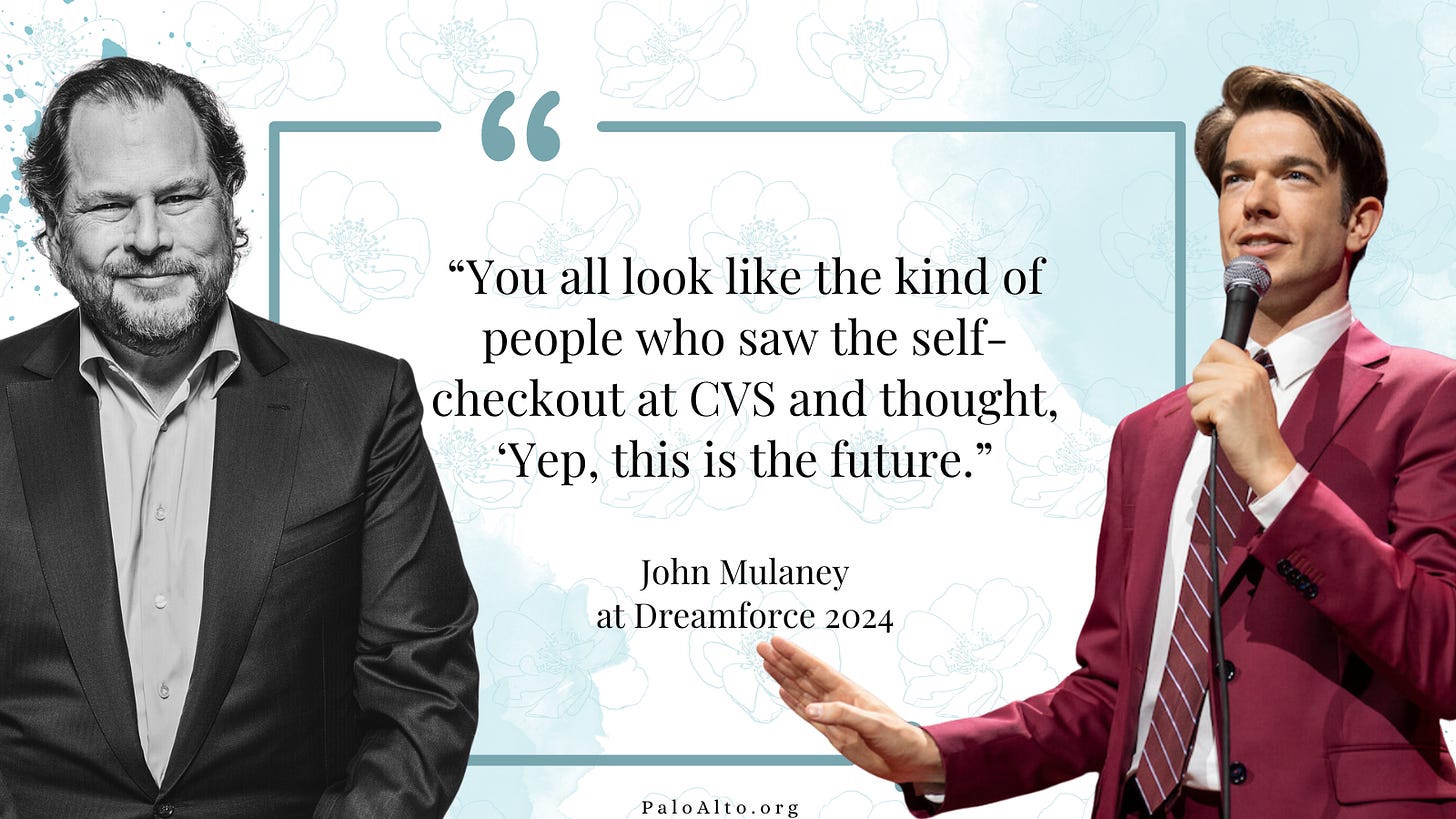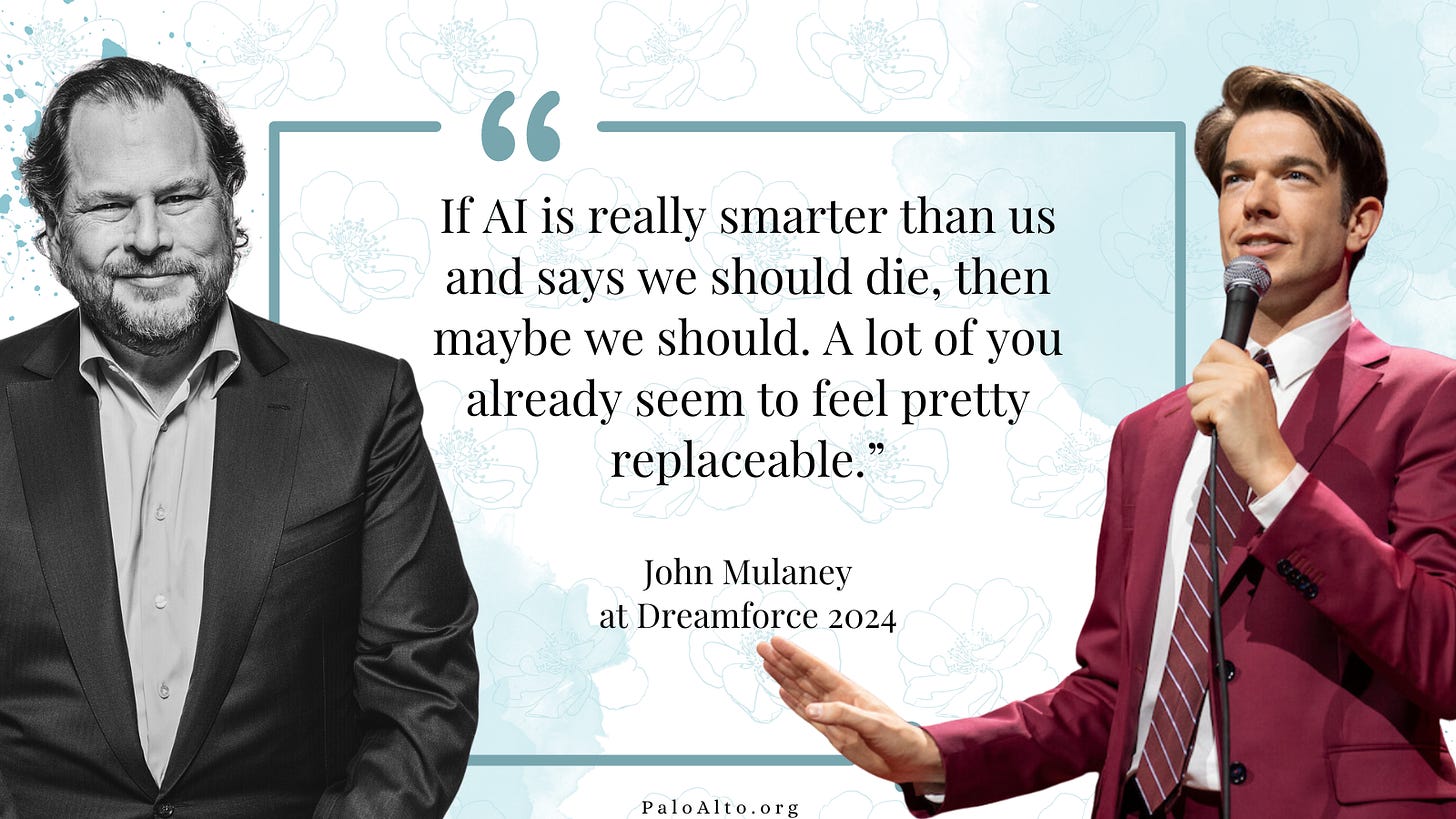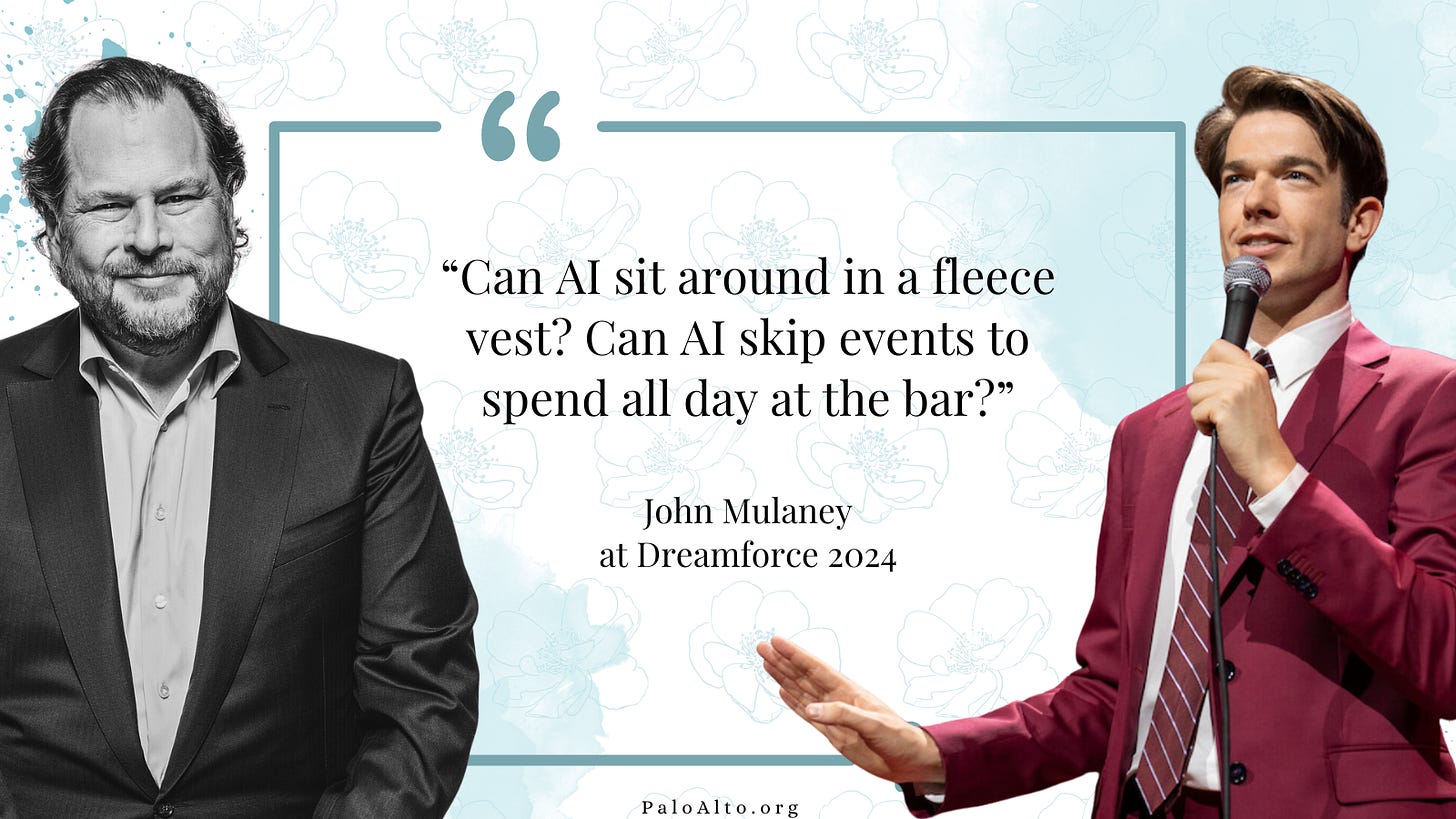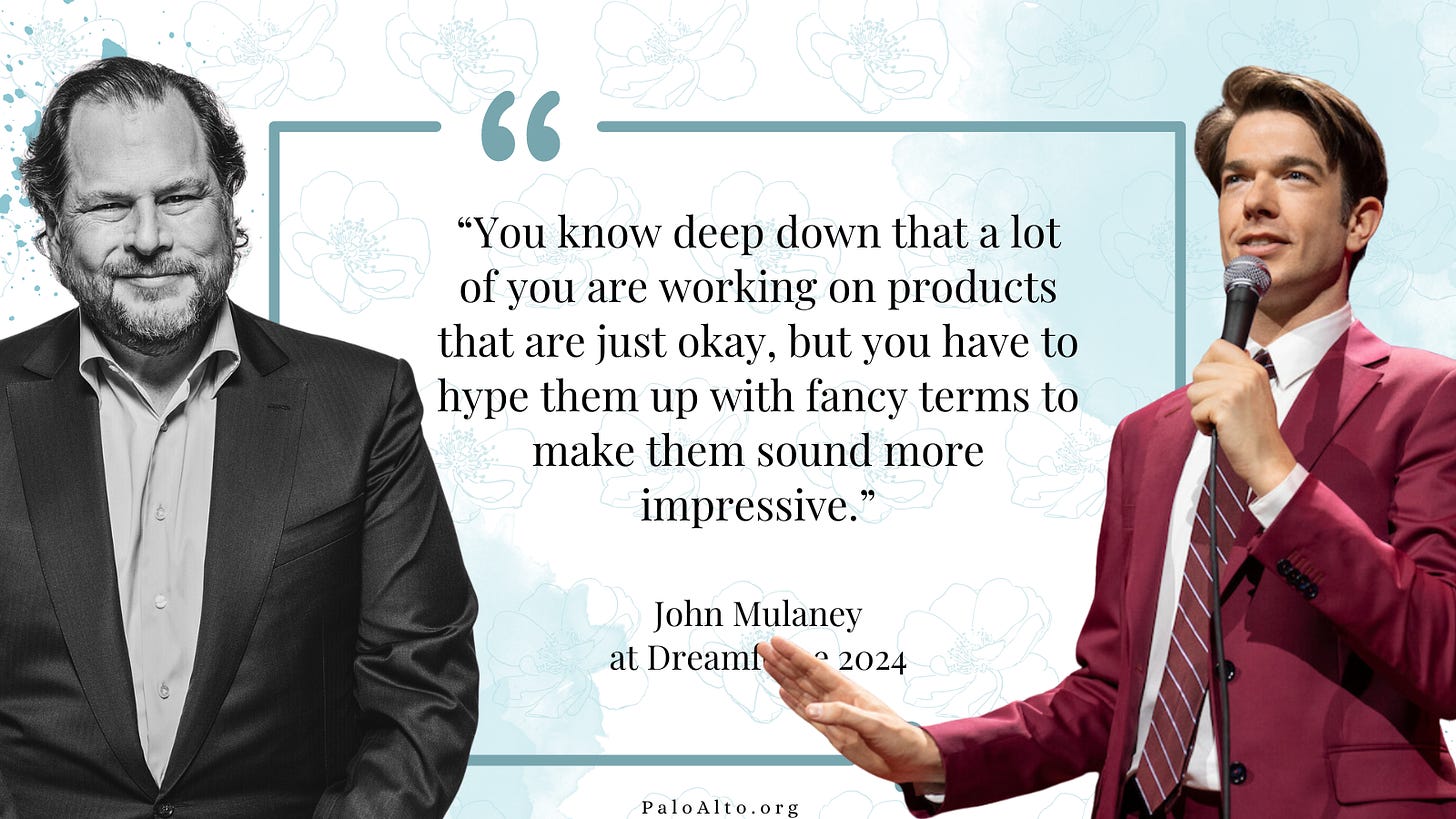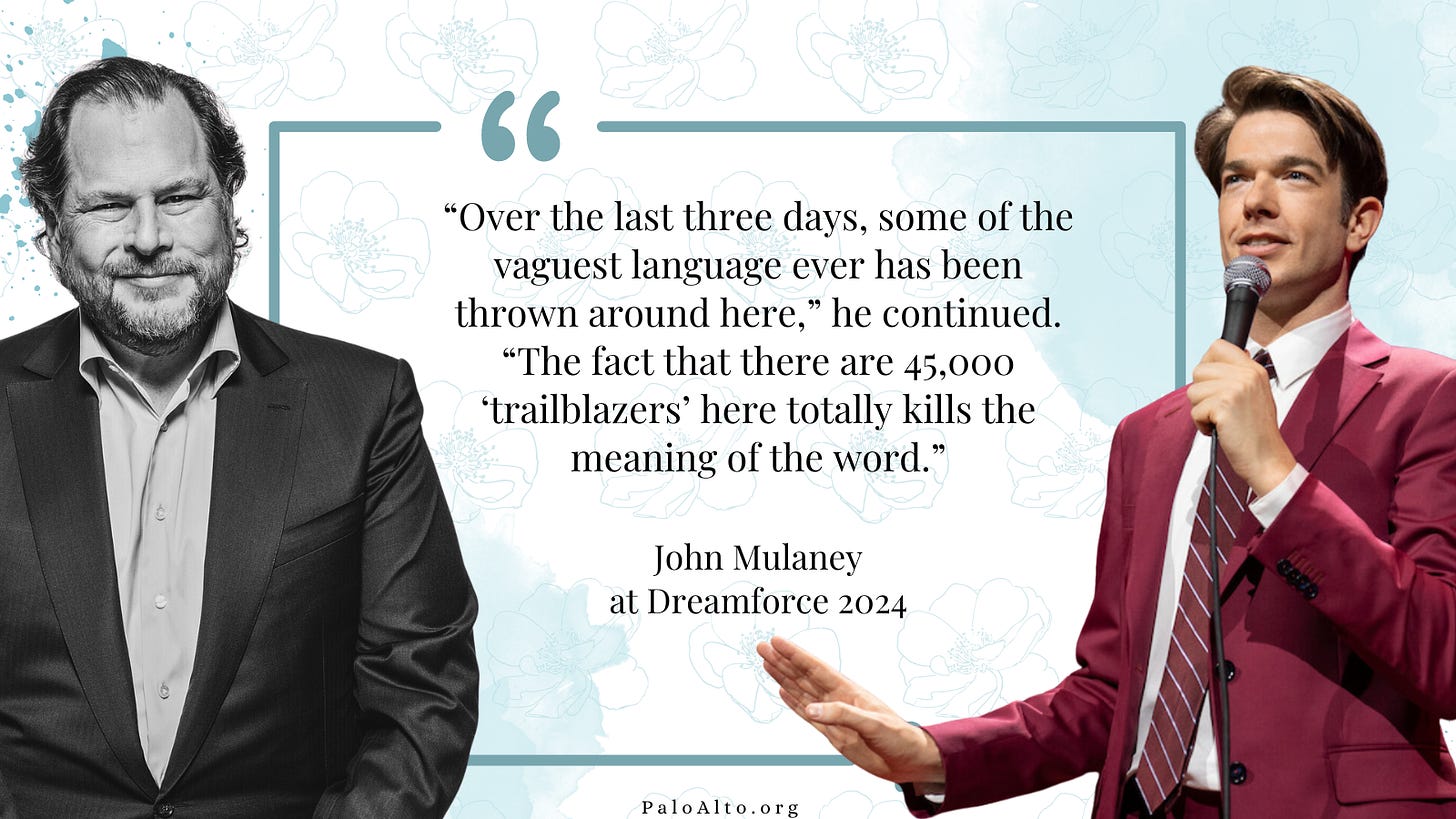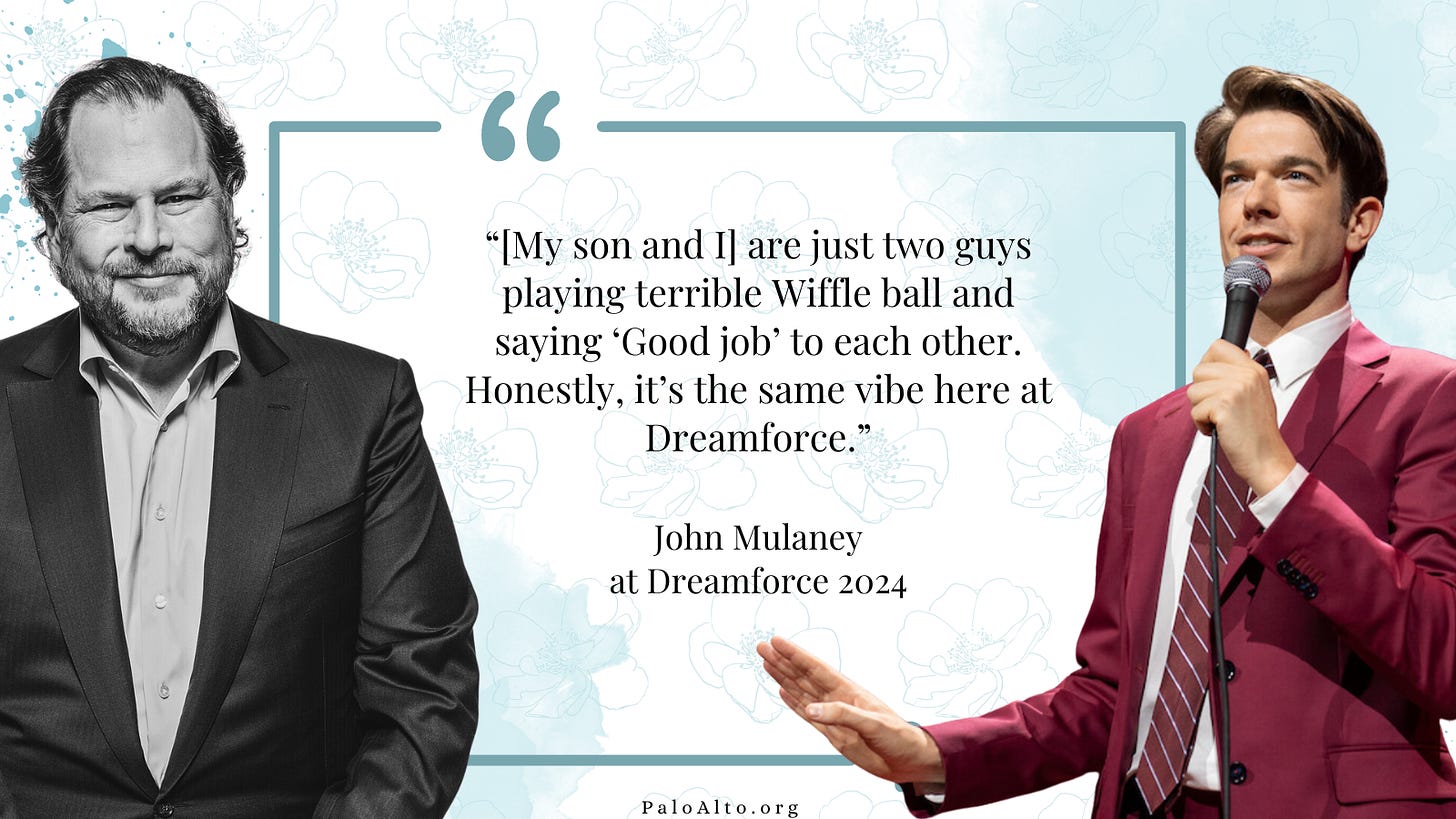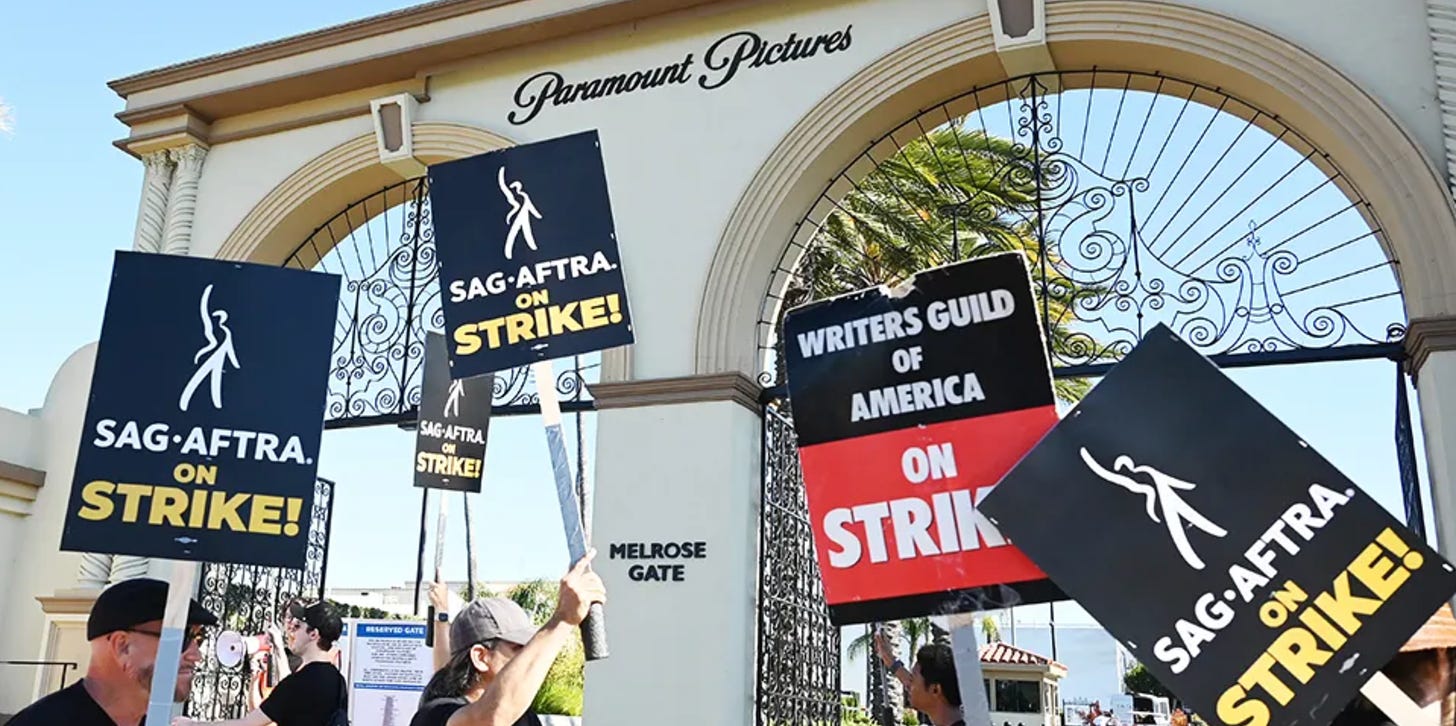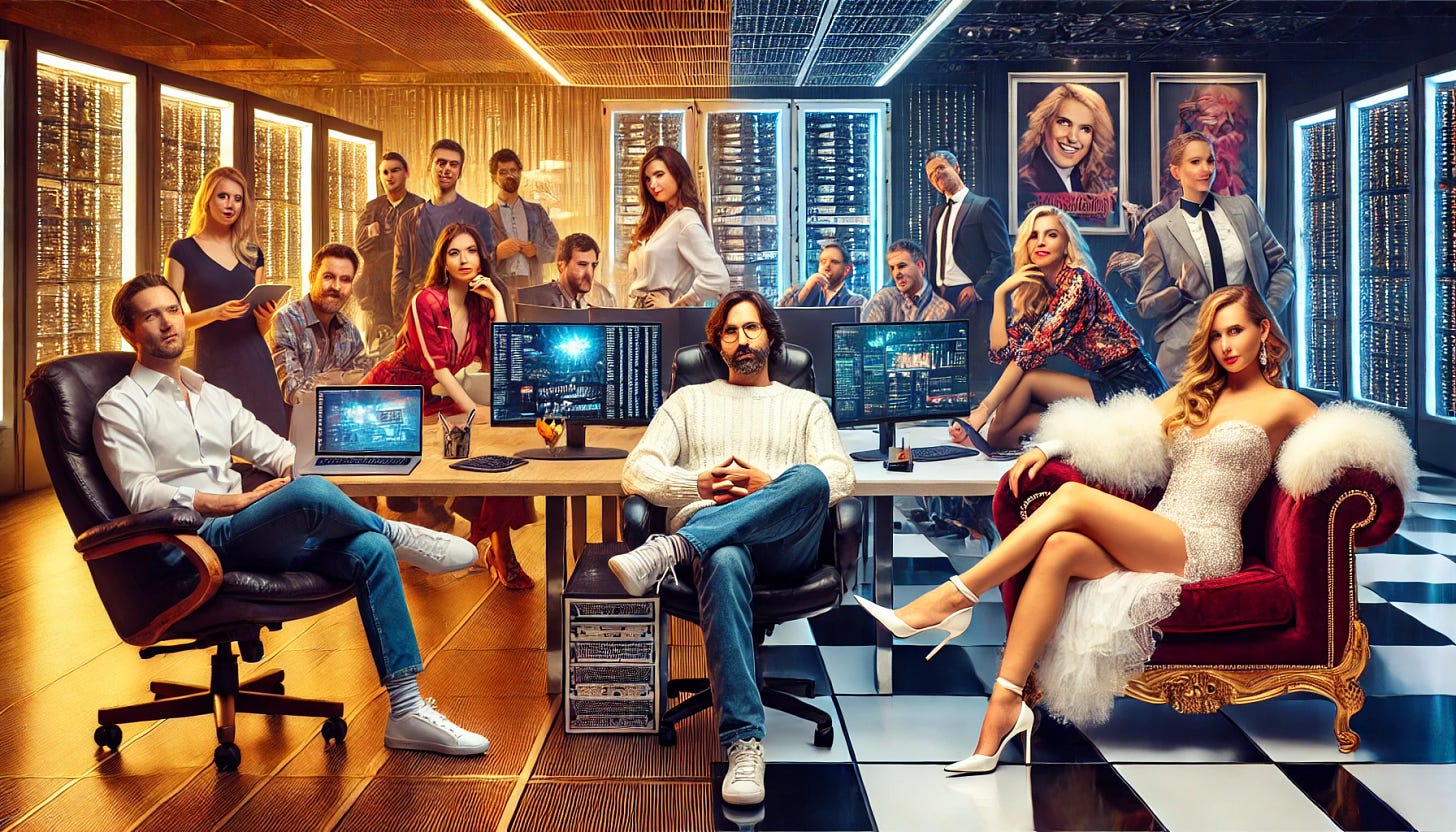John Mulaney's Savage Takedown of Tech Culture at Dreamforce AI Conference
What was meant to be an cushy corporate comedy gig for comedian John Mulaney at the Salesforce 2024 Dreamforce AI conference in San Francisco turned into an acerbic roast, with Reddit users comparing it to Ricky Gervais's iconic takedown of Hollywood at the Oscars. His tech takedown rapidly gained him fans across social media, but it elicited groans from the tens of thousands in attendance.
During his 45-minute set, Mulaney mixed in familiar material about his life, but much of his performance was focused on roasting the attendees and the event itself.
Here are some of the scorched-earth bombs John dropped. I’ve included images to share on social media if one in particular strikes a cord.
1. “Let me get this straight,” John Mulaney said. “You’re holding a ‘future of AI’ event in a city that has completely failed humanity?”
2. “You all look like the kind of people who saw the self-checkout at CVS and thought, ‘Yep, this is the future.’”
3. “If AI is really smarter than us and says we should die, then maybe we should,” he quipped, scanning the crowd. “A lot of you already seem to feel pretty replaceable.”
4. He added, “Can AI sit around in a fleece vest? Can AI skip events to spend all day at the bar?”
5. “You know deep down that a lot of you are working on products that are just okay, but you have to hype them up with fancy terms to make them sound more impressive,” Mulaney said.
6. “Over the last three days, some of the vaguest language ever has been thrown around here,” he continued. “The fact that there are 45,000 ‘trailblazers’ here totally kills the meaning of the word.”
7. “We’re just two guys playing terrible Wiffle ball and saying ‘Good job’ to each other,” he joked, referring to his son. “Honestly, it’s the same vibe here at Dreamforce.”
Typically, these sales guys can handle some ribbing and even a few jokes that punch at the gut, but the relentless nature of Mulaney's commentary suggested deeper frustrations. While much of comedy is rooted in truth, the contempt in his jokes was palpable.
By Sunday, snippets of the performance had gone viral, with many on social media celebrating Mulaney’s brash humor and expressing delight at seeing the tech industry taken down a peg, with many top Reddit comments deeming the set one of the funniest things they’d ever read.
At a slightly more formal affair, Ricky Gervais has cemented his status as an internet legend by critiquing the self-congratulatory nature of the numerous award shows that occur throughout the year. These events often come across as distasteful to those outside the Hollywood bubble, where comfort and privilege reign. As Gervais has pointed out, such celebrations can feel disconnected from the realities faced by the broader population, leading to a growing resentment towards the industry.
Many believe that the bubble surrounding Silicon Valley is even more pronounced. While success in Hollywood can lead to endorsement deals and fleeting fame, achieving success in Silicon Valley often translates to generational wealth, ensuring that one's grandchildren will never have to lift a finger. This disparity highlights a growing divide between those who thrive in the tech industry and the average American, raising questions about the nature of success and its implications for society.
Observers are increasingly aware that the levers of power appear to be concentrated in major hubs like San Francisco and New York, a dynamic that many in Middle America find unappealing. This concentration of influence fosters a sense of alienation and frustration among those who feel overlooked by the elite, further fueling the cultural divide between the coastal cities and the heartland. Gervais's sharp commentary serves as a reminder of these growing tensions and the need for greater awareness of the realities faced by people beyond the glamorous facade of Hollywood and Silicon Valley.
A Hollywood actor’s disdain for an AI-enabled sales platform, especially one as prominent as Salesforce in San Francisco, would likely stem from the growing tension between technology and the creative industries. AI platforms are fundamentally reshaping industries, and for actors, writers, and other creatives, there’s a sense that this shift threatens the core values of their craft. AI in tech, especially in platforms designed to enhance sales and business efficiencies, feels impersonal and automated—qualities antithetical to the creativity, emotional depth, and human expression that Hollywood thrives on. In light of the ongoing strikes, these tensions are heightened, as creatives feel their work is increasingly being commodified by tech companies.
The strikes in Hollywood, especially around issues like AI replacing actors and writers in certain functions, amplify this discontent. An actor would feel particularly threatened by a company like Salesforce, which symbolizes the tech industry's vast influence. Salesforce’s massive presence, with the tallest building in San Francisco, stands as a literal and figurative monument to tech’s dominance. To an actor, this building may represent more than just an impressive structure; it could symbolize the shift of power from creative to corporate, where AI, data analytics, and automation increasingly control industries. The feeling of being subverted by tech overlords—where decisions once made by human directors and producers are being handed over to algorithms—becomes a growing concern.
Actors and other creatives often express a sense of being undervalued by tech-driven platforms, as these companies prioritize efficiency, scalability, and profit over the human artistry that actors contribute. In the case of an AI-enabled sales platform like Salesforce, the focus is on using data to optimize customer relations and sales—an approach that may feel cold or transactional compared to the deeply personal, collaborative, and unpredictable nature of creative work. For many creatives, the rapid development of AI, especially in fields like scriptwriting, voice acting, and even digital avatars, feels like an existential threat, reducing their craft to lines of code and diminishing the importance of human artistry in favor of automation.
Moreover, the resentment may also come from the feeling that tech companies, particularly in San Francisco, are monopolizing wealth and influence in ways that distort the balance of power in entertainment and media. With platforms like Salesforce facilitating business growth through AI, the ability for creatives to maintain control over their work diminishes. There is a growing divide between the tech executives who fund and enable major projects and the creatives whose livelihoods are directly impacted. In this context, a Hollywood actor may see Salesforce not just as a successful company but as a representation of how tech companies increasingly decide the direction of media and entertainment, often without understanding or respecting the intricacies of the creative process.
Finally, this tension is intensified by the idea that the tech world, particularly AI-driven platforms, commodifies human creativity without proper acknowledgment of its value. To an actor, AI is often seen as a force that extracts value from their work—through automation, deepfakes, or even just data mining—without investing in or respecting the creative labor itself. In this way, platforms like Salesforce, with their enormous influence and focus on AI, may feel like yet another system designed to exploit human creativity for financial gain, while pushing aside the unique human elements that are the backbone of the entertainment industry.
Comedians possess a heightened sense of awareness and are quick to poke fun at those who fail to read the room. Their unique perspective allows them to comment on societal issues in a way that resonates with audiences, revealing truths that others may overlook. By highlighting the absurdities of modern life, they encourage us to question the status quo. This skill is particularly relevant in an era where perception often trumps reality.
This commentary suggests that both AI and the self-important corporate facade need a reality check to bring Silicon Valley down to earth. As the tech industry continues to shape our lives, it’s crucial to introduce some common sense into the conversation. Addressing these issues can help us navigate the complexities of the future of work and its implications for society. Ultimately, fostering a more grounded dialogue will allow us to make informed decisions that benefit everyone.


